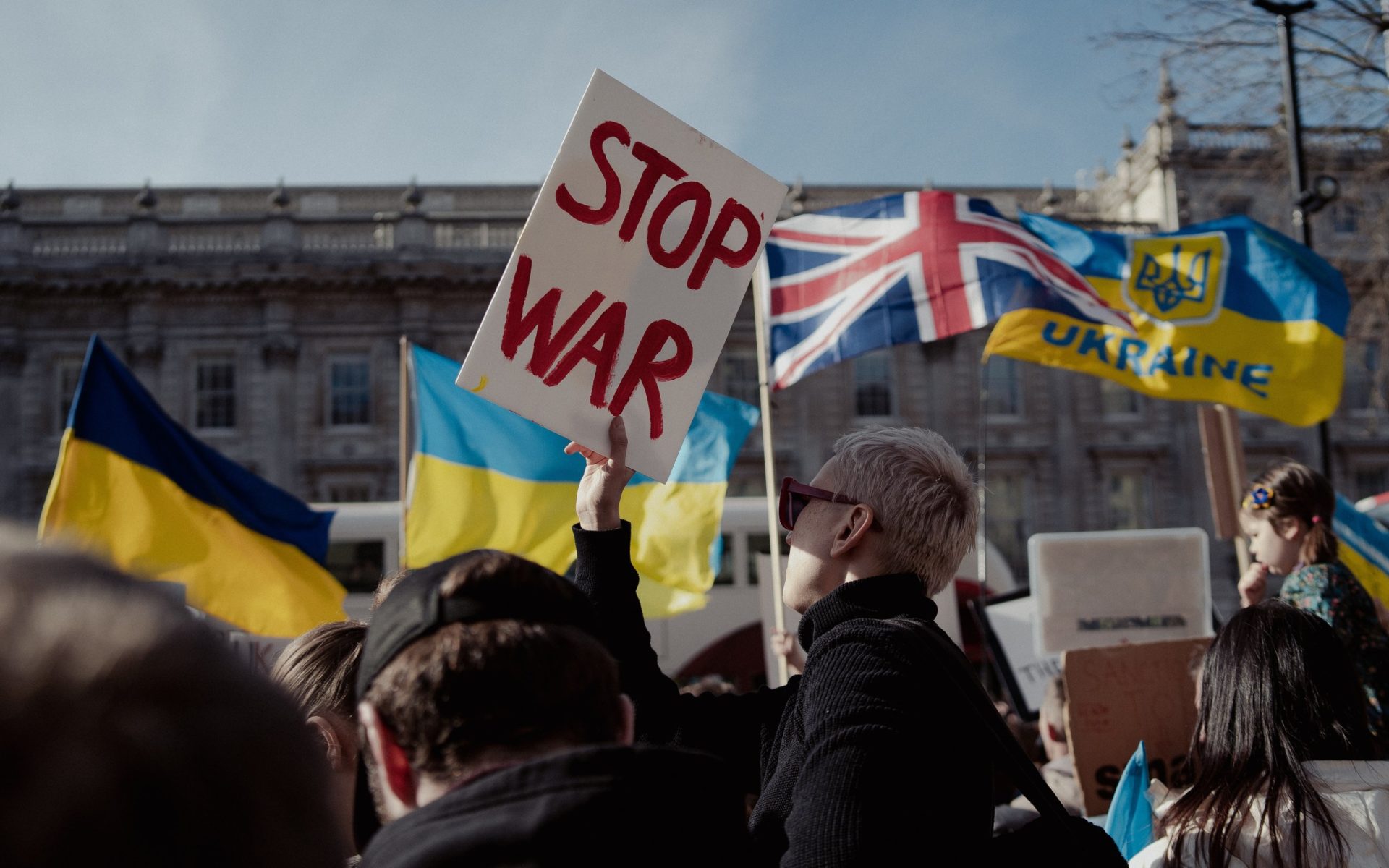
An end to the war in Eastern Europe through a grand bargain on Ukrainian neutrality seems to come closer. After the Russo–Ukrainian negotiations on Tuesday, March 29, in Istanbul, both parties reported significant progress. The Ukrainian delegation supposedly presented a framework for the country’s neutrality with security guarantees from third-party states. While the content of that proposal is unknown, the negotiations are expected to continue Wednesday.
This is a significant leap forward from what until now has been mainly an academic debate—albeit one with many prominent supporters, including high-caliber U.S. political scientists like John Mearsheimer or Steve Walt, and European public intellectuals like the Austrian Heinz Gärtner or former Greek Finance Minister, Yanis Varoufakis.
The progress comes at a time when the U.S. public debates ideas about what exactly “Ukrainian neutrality” would mean, especially among the higher echelons of Washington’s foreign policymakers. On March 17, a former Assistant Secretary of State, A. Wess Mitchell, published a call for Ukrainian “fortified neutrality” in Foreign Affairs.
The progress on the intellectual and diplomatic front in Moscow, Kyiv, and Washington is good news because a neutrality agreement for Ukraine is really the only alternative to a protracted and bloody war of attrition like that of Afghanistan.
To understand why that is, one only needs to ask the question: What are the options for the current situation? The West has imposed unprecedented sanctions, but sanctions rarely end wars on their own. They have a lousy track record of doing so – and I dare you to name one major war that was ended by sanctions.
Moreover, the West is pumping Ukraine full of weapons but is (luckily) not willing to risk a third World War by sending in NATO troops or imposing a no-fly zone. Former U.S. Ambassador Chas Freeman has pointedly called this the West’s willingness to “fight to the last Ukrainian.”
And let’s be real, in terms of possible scenarios, sending in NATO troops would only widen the conflict, kill more people, and devastate the entire European continent – potentially with nukes. That is not a happy outcome either.
The only way to end this war without even more suffering is a negotiated end. This point can’t be stressed enough. Since an all-out military victory of either side is unlikely to emerge soon, this war must be ended by talks.
But here comes the caveat: Although the negotiations are taking place between Ukraine and Russia, the invisible third partner at the table is the United States. Despite White House assurances that Ukraine is not a proxy war, Russia clearly views it as such. The Russians have often said that they want to negotiate with “the West,” meaning mainly Washington and NATO. Those were the counterparts that Russia sent its two infamous draft treaties to back in December 2021. If Russia thinks of the U.S. as a key stakeholder, Washington will remain a force in the game. Therefore, it matters that the U.S., too, at least tacitly accepts Ukrainian neutrality – otherwise it might not happen, or the agreement might not hold.
What is needed is a three-way consent on what is called a “neutralization” of Ukraine. Neutralization, in this context, is a purely technical term, meaning “to make permanently neutral by way of international agreement.” It stands in contrast with unilateral declarations of neutrality like, let’s say, Mongolia, which in 2015, at the UN General Assembly, announced that it would like to be regarded as a neutral country, but has no international agreement for backing up its new status (which in the case of Mongolia doesn’t matter, because no one rejects or disputes its claim).
Neutralizations were very much en vogue back in the late 19th and early-20th centuries when the international community neutralized anything from entire states (Switzerland, Belgium, Luxemburg) to non-sovereign territories (the Ionian Islands, Åland Islands, Haute-Savoie), colonies (the Congo), waterways (Panama Canal), and even infrastructure-like telegraphic cables and railway lines. Basically, anything that was of international value to many parties could potentially be neutralized to make sure it would remain free and available even during interstate wars.
There is a mixed history to these neutralizations, some worked very well and are still in force today, such as Switzerland, Åland Islands, and the Panama Canal. Others collapsed under external warfare or were ended when the international community forgot about them, like Belgium, the Ionian Islands, and Haute-Savoie. However, in all cases, the neutralizations brought about at least a couple of decades of stability. The German invasion of Belgium in 1914 is often used as an example that neutrality doesn’t work, but this view tends to forget that it did work for 70 years – not an insignificant amount of time.
For Ukraine, the good news is that the so-called law of neutrality that governs this part of international law is out there and ready to use. It hasn’t been applied for half a century – the last famous international attempt was the neutralization of Laos in 1962 – but brush off the dust and go for it, neutrality law has never been revoked.
The content of a neutralization can be very flexible and is up to the actual agreements made between the parties. They can or cannot include limitations on military cooperation, the use of territory, the deployment of foreign troops, or the fortification of certain plots of land (or water). However, the crux – and the power – of neutralizations is that they are multilateral agreements to which all stakeholders have to say “yes” and bind themselves to.
On the one hand, that is not easy to achieve, but on the other hand, it’s a powerful outcome because a good neutralization agreement will assure that keeping the agreement alive is in the interest of all parties. It is the strongest guarantee in the intra-national world for keeping any deal alive. It requires the participation of all major political stakeholders to be realistic. Moscow, Kyiv, and Washington need to say “OK.”
The consent of Ukraine is important because it will be tasked with upholding the neutrality agreement internally, defending it against domestic and international political attacks, and living up to the letter and the spirit of what will be concluded. Russia matters because it needs to stop the bombing and withdraw its troops to the agreed lines. The U.S. matters because it will need to prevent the subversion of the agreement by spoilers inside Ukraine or inside the Trans-Atlantic networks that would rather see Ukraine fight the war to the end — just like Afghanistan, which had devastating consequences for its civilian population.
The U.S. will have to hold the back of the Ukrainian negotiating team by not subverting President Zelensky if an agreement with Russia becomes likely. That was the fate of the South Vietnamese President Diem, who was assassinated by his own Generals when his secret negotiations with the North for a peace settlement became likely to succeed. It is known today that the assassination happened with the knowledge and consent of U.S. president J.F. Kennedy.
To succeed, the content of the neutralization must find that “goldilocks position” between the fronts. In other words, they need to find the lowest common denominator that all three parties can agree to. It is nearly impossible to correctly guess what this means without access to the actual negotiations, but it will likely include some versions of the following:
-
Ukraine’s constitution would need to be amended to promise the country’s permanent neutrality according to the Swiss or Austrian models. This includes the promise to never station foreign troops on Ukrainian soil – neither NATO nor Russia.
-
Survival of the current political leadership of Ukraine and uninfluenced political elections in the future.
-
Access to foreign (Western) weapon systems, albeit only of a defensive nature.
-
Removal of the Azov Battalion, a Ukraine militia group with Neo-Nazi ties, from Ukraine’s national guard and maybe a cap on the size of the Ukrainian army, like the cap imposed on Germany during the reunification process.
-
A roadmap for the reintegration of the Donbas regions into the body politic of Ukraine in conjunction with a strong federalization of the state (a revived Minsk Agreement).
-
The recognition of Crimea as part of the Russian Federation.
The last two points might be the most controversial; however, it is important to recognize how they are different. The Donbas regions are political bargaining chips for Moscow, as their survival depends on Russia. Their reintegration into Ukraine would serve Moscow as it would all but guarantee Ukraine’s neutrality if it became a strongly federalized state where the regions have veto power over fundamental changes in foreign policy. Belgium would be the model here (in 2016, the Belgian region of Wallonia was able to temporarily block an EU–Canada trade deal). Reintegration of the Donbas into Ukraine is hence in the interest of Moscow.
Crimea is an utterly different case. There is no realistic scenario short of defeat in a total war under which Russia would be willing to give up the peninsula. Its entire Black Sea Fleet and regional power depend on it. Crimea is to Russia what the Golan Heights are to Israel, and it is simply not probable that either will ever return to their lawful owners without them winning a war. It was, therefore, a smart move of Mr. Zelensky to propose the postponing of the Crimean question for 15 years, albeit it is not clear if Russia will accept that tactic.
The tragedy of the entire war is that this outcome—which would spare the most lives—is more or less bargaining for the status quo. It is how Ukraine used to exist in the international community before everything went sour. Ukraine already had a neutrality article in its constitution until 2014, and politically fluctuated between Russia and the West, depending on which national political forces were elected into office.
Only the invasion of Crimea caused Ukraine to abandon the neutrality article, but that invasion was from the Russian side a reaction to the Maidan Coup in Kyiv and the 2008 NATO declaration that Ukraine will become a member in the future. To forestall losing one of its most important military bases, Russia annexed the peninsula. This 14-year long process is a perfect example of a slow but steady international escalation.
At the end of the day, peace and stability are reached by a few signatures on a piece of paper, when all relevant stakeholders agree to a common vision of the future, be it a declaration of surrender (Japan in 1945), a security settlement (Helsinki Final Act of 1975), or a neutralization agreement (Austria in 1955). War is often unilateral, peace is almost always multilateral. Let’s hope multilateralism will prevail soon, including the consent of the invisible partner.
(This article is a revised and updated version of a piece that has first appeared on moderndiplomacy.eu. Find out more about the topic on neutralitystudies.com)

Dr. Pascal Lottaz
Dr. Pascal Lottaz is an Adjunct Researcher for Neutrality Studies at the Waseda Institute for Advanced Study (Tokyo), and Adjunct Professor for European Politics at Temple University Japan Campus. His book publications include Sweden, Japan, and the Long Second World War (Routledge, 2022), Permanent Neutrality: A Model for Peace, Security, and Justice (Lexington Books, 2020), and Notions of Neutralities (Lexington Books, 2019). He leads the research network neutralitystudies.com.






